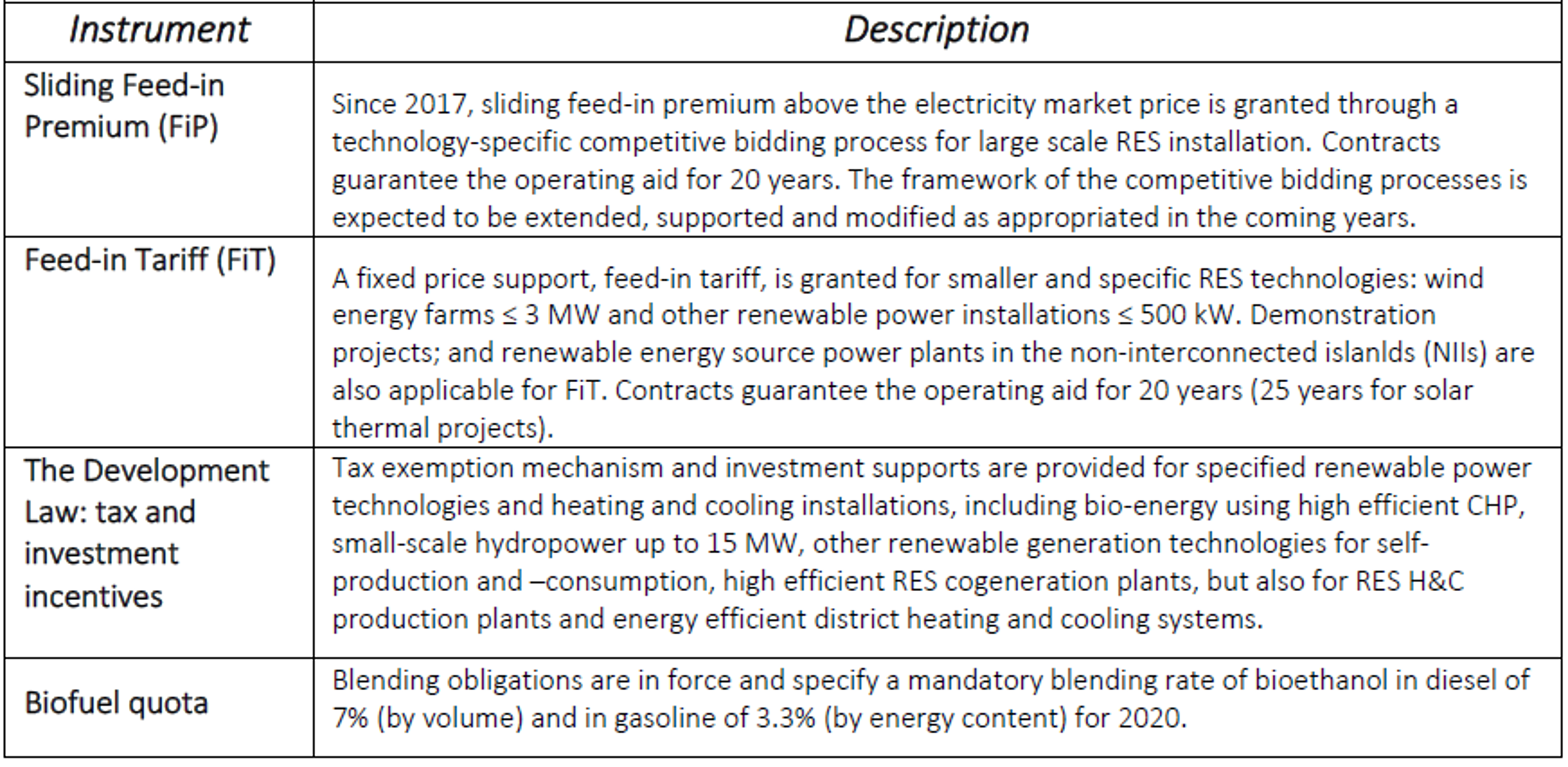Greece
Renewable Energy Status


RES-Promoting Policy Instruments

Current Renewable Energy Policy
RES - Electricity
The key support for RES technologies in power generation is sliding feed-in premiums (FiP), granted after successful participation in technology-specific tenders (competitive bidding processes). These plants are required to participate in market mechanisms either autonomously or through the RES aggregator. Exceptions are wind energy farms ≤ 3 MW and other renewable power installations ≤ 500 kW, which are supported through feed-in tariffs.
Specific photovoltaic park projects, contributing to the replacement of lignite power, in the area of Western Macedonia and Megalopolis will receive investment and tax incentives under the Just Transition Development Plan. Moreover, autonomous generating RES installations up to 500 kW (e.g. households with a solar PV installation) or 1 MW for energy communities and other entities of public benefit are eligible for a net metering scheme. The scheme has been implemented since 2015 and allows electricity consumers who also generate electricity, e.g., to ‘virtually’ consume their self-generated electricity at any time through a billing agreement.
Under the new Development Law 2022, an income tax exemption mechanism or alternatively an investment grant scheme is available for specified renewable power technologies, including bio-energy using high efficient CHP, small-scale hydropower up to 15 MW and other renewable generation technologies for self-production and -consumption. Hybrid renewable power plants on non-interconnected islands ≤ 5 MW are also supported. A complementary market mechanism in place is the guarantees of origin (GOs) for each MWh of electricity produced from RES or combined heat and power (CHP) in certain facility for a certain period of time.
RES - Heat
To encourage renewable energy use for heat production, FiTs for rooftop PV applications are applicable to residences that cover a part of their water heating needs by some other renewable energy source (e.g. solar thermal). The installation systems for RES H&C in domestic and tertiary sectors are supported through tax incentives and investment subsidies. The new Development Law provides income tax relief and investment grant not only for high efficient RES cogeneration plants, but also for RES H&C production plants and energy efficient district heating and cooling systems. Moreover, financing programmes are available to promote the use of RES for heating, cooling and hot water use, as well as to improve energy efficiency in hotels, tourist accommodation.
Authorisation Procedures
In Greece, while implementing an energy system, every discrete component that the system is comprised of shall follow a separate licensing process. The overarching rule for issuing such licenses includes the following successive major steps:
- A ‘power production certificate’ refers to both energy and spatial space for a specific technology, according to a recent 2020 domestic law.
- The ‘environmental permit’ that the owner of the power production certificate is obliged to apply for within six to eighteen months, after the issuance of the power production certificate. Variations and additional demands may arise, depending on the siting of the project (e.g. within a NATURA 2000 or similar protected area).
- The ‘installation license’ allows the project’s owner to initialize the construction of the project. Nevertheless, issuing the installation license may also include various other permits and licenses depending on the very nature of each project. For example, a certain project may include the construction of buildings, marinas, docks, electricity networks, electromechanical facilities, or other accompanying infrastructures and procedures like connection to the local grid, which shall be licensed according to the proper legislation.
References & Sources for Further Reading
- Development Law – Greece Strong Growth, https://noisis.gr/program/new-development-law-2/?lang=en
- Fourth biennial report under the United Nations Framework convention on climate change, https://unfccc.int/sites/default/files/resource/BR4_Greece.pdf
- Greece’s Climate Law, https://www.bloomberg.com/news/articles/2021-11-04/greece-brings-in-climate-law-banning-fossil-fuel-cars-from-2030
- Greece’s Recovery and Resilience Plan, https://commission.europa.eu/business-economy-euro/economic-recovery/recovery-and-resilience-facility/greeces-recovery-and-resilience-plan_en
- International Energy Agency (IEA) Policies database, (https://www.iea.org/policies)
- Just Transition Development Plan of lignite areas, (https://www.sdam.gr/sites/default/files/consultation/Master_Plan_Public_Consultation_ENG.pdf)
- National Energy and Climate Plans (NECPs), https://ec.europa.eu/energy/sites/ener/files/el_final_necp_main_en.pdf
